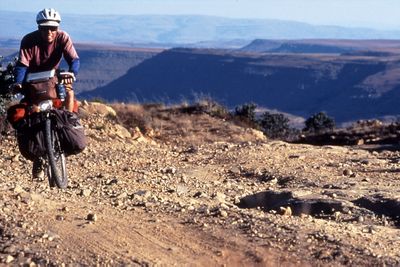Biking on a global scale
Willie Weir pushes cycling to improve health and environment

Bicycle traveler-adventurer Willie Weir said he’s learned by pedaling across the globe that his preferred form of transportation is more than a choice of lifestyle. It’s also about class differences, the environment, land use, safe routes and staying healthy.
The Seattle author will speak in Spokane Wednesday in an appearance sponsored by the Bicycle Alliance of Washington, which is trying to raise money so it can open an office here – part of the organization’s effort to promote what it calls “balanced transportation” across the state.
In an interview last week, Weir said he discovered the joy of bicycle touring years ago and quickly realized that pedaling in other countries brought him closer to the people and experiences he had gone there to enjoy.
He tells a story about a rich man in India who stopped his chauffeured car to ask him why he would ride a bike when, as an American, he could surely afford motorized transportation. “Riding a bicycle in his culture is tantamount to saying you are poor,” Weir said.
But to Weir, it’s a choice that has tangible benefits, both to the rider and to the globe. “We live in such an auto-dominated society,” he said. “We’ve become fatter and fatter by the hour.”
In Bogota, Colombia, the bicycle becomes a community focal point each Sunday when the city closes 75 miles of arterial streets and opens them to bicycles only, an event called “Ciclovia.”
The way different countries treat bicycle transportation is a lesson in cultural adaptation, he said. It’s dangerous now to ride in Thailand because the population has switched to using motor scooters. In China, the emerging middle class is taking over roads with automobiles, he said.
He wants Americans to think of how an expansion of bicycle transportation would have a positive impact on energy consumption, the reduction of air pollution, including greenhouse gas emissions, and suburban sprawl.
“You don’t see the possibility of change until you see the instruments of change,” he said.
Gordon Black, executive director of the Bicycle Alliance, said his organization wants to spread the word about the benefits of enhancing bicycle transportation in Spokane. The group has about 100 members here and teams up with other bicycle organizations in supporting a new bicycle master plan in Spokane, completion of a rails-to-trails link between Spokane and Fish Lake and increased federal funding for bicycle transportation links.
“The way we’ve been doing things is no longer the way we should do things,” Black said.